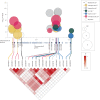Genetics and epigenetics of primary Sjögren syndrome: implications for future therapies
- PMID: 36914790
- PMCID: PMC10010657
- DOI: 10.1038/s41584-023-00932-6
Genetics and epigenetics of primary Sjögren syndrome: implications for future therapies
Abstract
In primary Sjögren syndrome (pSS), chronic inflammation of exocrine glands results in tissue destruction and sicca symptoms, primarily of the mouth and eyes. Fatigue, arthralgia and myalgia are also common symptoms, whereas extraglandular manifestations that involve the respiratory, nervous and vascular systems occur in a subset of patients. The disease predominantly affects women, with an estimated female to male ratio of 14 to 1. The aetiology of pSS, however, remains incompletely understood, and effective treatment is lacking. Large-scale genetic and epigenetic investigations have revealed associations between pSS and genes in both innate and adaptive immune pathways. The genetic variants mediate context-dependent effects, and both sex and environmental factors can influence the outcome. As such, genetic and epigenetic studies can provide insight into the dysregulated molecular mechanisms, which in turn might reveal new therapeutic possibilities. This Review discusses the genetic and epigenetic features that have been robustly connected with pSS, putting them into the context of cellular function, carrier sex and environmental challenges. In all, the observations point to several novel opportunities for early detection, treatment development and the pathway towards personalized medicine.
© 2023. Springer Nature Limited.
Conflict of interest statement
M.W.-H. has received research grants from Merck KGaA and Janssen Pharmaceutica NV during the past 5 years. G.E.T. and A.B. declare no competing interests.
Figures






References
-
- Shiboski CH, et al. 2016 American College of Rheumatology/European League Against Rheumatism classification criteria for primary Sjögren’s syndrome: a consensus and data-driven methodology involving three international patient cohorts. Ann. Rheum. Dis. 2017;76:9–16. doi: 10.1136/annrheumdis-2016-210571. - DOI - PubMed
Publication types
MeSH terms
LinkOut - more resources
Full Text Sources
Medical
Research Materials

